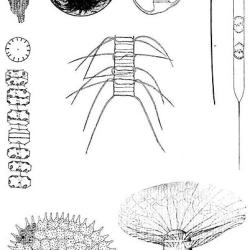Source Institutions
Source Institutions
Add to list Go to activity
Activity link broken? See if it's at the internet archive

In this activity, learners are challenged to design a planktonic organism that will neither float like a cork nor sink like a stone. They are given pictures of planktonic organisms and simple materials. The best model of a planktonic organism will sink slowly or be neutrally buoyant. After designing with their teammates, learners test and race their plankton in a simulated ocean.
- 10 to 30 minutes
- 30 to 45 minutes
- $5 - $10 per group of students
- Ages 8 - adult
- Activity, Lesson/Lesson Plan, Model
- English
Quick Guide
Materials List (per group of students)
- aquarium or large tub
- water to fill aquarium
- two stopwatches
- a knife for cutting corks
- 1 sheet each of red, blue and white paper
- 28 sheets yellow paper (or another color that is not red, blue or white)
- pictures of plankton (optional)
- video about plankton (optional)
- one to several gallon jars or clear plastic shoeboxes (e.g. plastic mayonnaise)
- water to fill the gallon jars or plastic shoeboxes
- container or plastic bag filled with the following found materials: recycled Styrofoam packing "peanuts," corks (whole and half), toothpicks, paper clips, metal washers, colored yarn, split-shot fishing sinkers, 1" - 2" square pieces of sponge
- 2 pairs of scissors
- sponge to mop up drips
Subjects
-
Earth and Space Science
-
Earth Structure
- Oceans and Water
-
Earth Structure
-
Life Sciences
-
Diversity of Life
- Animals
- Viruses and Bacteria
- Protists and Fungi
- Classification
-
Ecology
- Ecosystems
-
Evolution
- Mechanisms of Evolution
-
Diversity of Life
-
Physical Sciences
- Motion and Forces
-
States of Matter
- Solids
- Liquids
-
Structure and Properties of Matter
- Volume and Density
-
The Nature of Science
-
The Scientific Process
- Conducting Investigations
-
The Scientific Process
Informal Categories
- Animals
- Model Building
- Nature and Environment
Audience
To use this activity, learners need to:
- see
- see color
- touch
Learning styles supported:
- Involves teamwork and communication skills
- Involves hands-on or lab activities
Other
Includes alignment to state and/or national standards:
Includes assesments for student learning:
This resource is part of:
Access Rights:
- Free access
By:
Rights:
- All rights reserved, Centers for Ocean Sciences Education Excellence,
Funding Source:
- National Science Foundation
